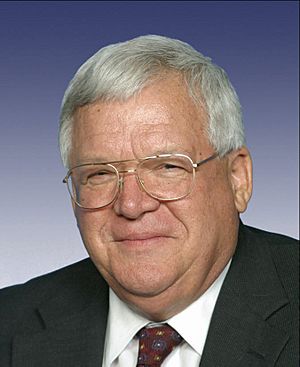Dennis Hastert facts for kids
Quick facts for kids
Dennis Hastert
|
|
|---|---|

Official portrait, 2005
|
|
| 51st Speaker of the United States House of Representatives | |
| In office January 6, 1999 – January 3, 2007 |
|
| Preceded by | Newt Gingrich |
| Succeeded by | Nancy Pelosi |
| Leader of the House Republican Conference | |
| In office January 6, 1999 – January 3, 2007 |
|
| Preceded by | Newt Gingrich |
| Succeeded by | John Boehner |
| House Republican Chief Deputy Whip | |
| In office January 3, 1995 – January 3, 1999 |
|
| Leader | Newt Gingrich |
| Preceded by | Bob Walker |
| Succeeded by | Roy Blunt |
| Member of the U.S. House of Representatives from Illinois's 14th district |
|
| In office January 3, 1987 – November 26, 2007 |
|
| Preceded by | John Grotberg |
| Succeeded by | Bill Foster |
| Member of the Illinois House of Representatives from the 82nd district |
|
| In office January 1983 – January 1987 |
|
| Preceded by | Constituency established |
| Succeeded by | Edward Petka |
| Member of the Illinois House of Representatives from the 39th district |
|
| In office January 1981 – January 1983 Serving with Suzanne L. "Sue" Deuchler, Lawrence "Laz" Murphy
|
|
| Preceded by | William L. Kempiners Allan L. "Al" Schoeberlein |
| Succeeded by | Kenneth C. Cole |
| Personal details | |
| Born |
John Dennis Hastert
January 2, 1942 Aurora, Illinois, U.S. |
| Political party | Republican |
| Spouse |
Jean Kahl
(m. 1973) |
| Children | 2 |
| Education | North Central College Wheaton College, Illinois (BA) Northern Illinois University (MS) |
| Signature |  |
John Dennis Hastert (born January 2, 1942) is an American former politician. He was also a teacher and a wrestling coach. He represented the 14th district of Illinois in the U.S. House of Representatives. This was from 1987 to 2007.
Hastert also served as the 51st Speaker of the United States House of Representatives. He held this important role from 1999 to 2007. He was the longest-serving Republican Speaker in history. After his time as Speaker, he became a lobbyist.
Contents
Dennis Hastert's Early Life and Education
Dennis Hastert was born in Aurora, Illinois, on January 2, 1942. He was the older of two sons. His family had a farm supply business and a farm. Young Dennis helped out by bagging feed and doing farm chores. He also worked as a fry cook at his family's restaurant.
Hastert went to Oswego High School. He was a talented athlete there. He played football and was a star wrestler.
He first attended North Central College. Later, he transferred to Wheaton College, a Christian liberal arts school. In 1964, he earned his Bachelor of Arts degree in economics from Wheaton. He then received his Master of Science degree in 1967. This was from Northern Illinois University (NIU).
Dennis Hastert's Political Career
Before entering politics, Hastert was a high school teacher and coach. He taught at Yorkville High School in Illinois from 1965 to 1981.
He first ran for the Illinois House of Representatives in 1980 but did not win. He tried again and won a seat in 1981. He served there until 1987.
In 1986, Hastert was elected to the United States House of Representatives. He was re-elected every two years until he retired in 2007. He moved up in the Republican Party. In 1995, he became the chief deputy whip.
In 1999, he became the Speaker of the United States House of Representatives. This is a very powerful position. As Speaker, Hastert supported the policies of President George W. Bush. After the 2006 elections, Democrats gained control of the House. Hastert then decided to retire from his House seat. He later became a lobbyist.
Dennis Hastert's Family Life
Dennis Hastert married Jean Kahl in 1973. They have two children, Ethan and Joshua.
His older son, Joshua, worked as a lobbyist. He represented different companies. His younger son, Ethan, also became involved in politics. In 2010, Ethan ran for his father's old congressional seat. He did not win that election. However, in 2011, Ethan won a seat on the village board of Elburn, Illinois. He later moved and left the board in 2014.
Images for kids
See also
 In Spanish: Dennis Hastert para niños
In Spanish: Dennis Hastert para niños
 | Chris Smalls |
 | Fred Hampton |
 | Ralph Abernathy |





